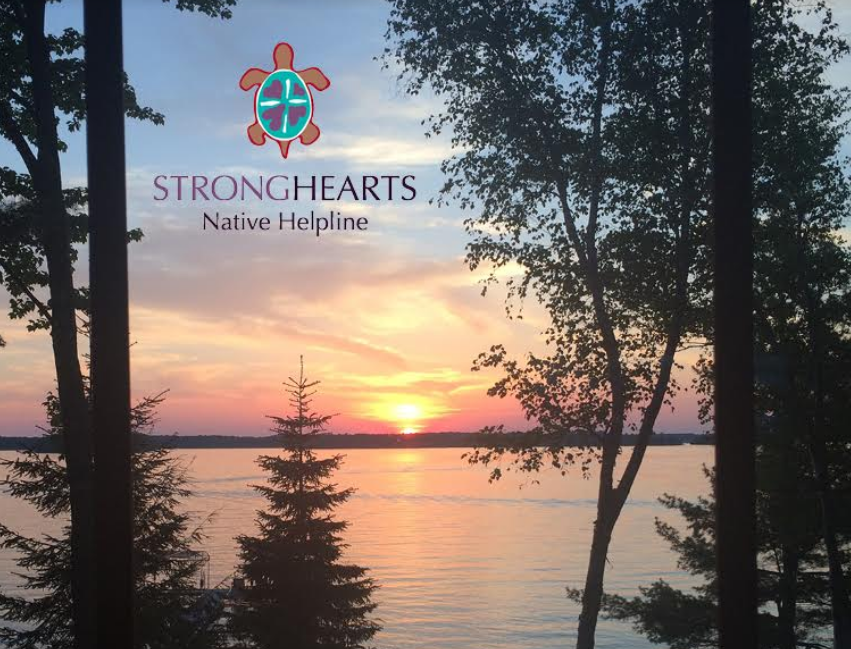
- Details
- By Native News Online Staff
EAGAN, Minn. — In an effort to expand its existing domestic and sexual violence advocacy services in Michigan, StrongHearts Native Helpline announced it has partnered with the Division of Victim Services at Michigan’s Department of Health and Human Services.
The partnership enhances the work already being done in the area of tribal domestic violence and shelter. The project is funded by the Michigan Department of Health and Human Services.
This project will give Native American victim-survivors in Michigan access to culturally-appropriate advocacy 24/7 even if they call their local tribal program after regular operating hours.
“In general, urban Natives are underserved; and this is a cost-effective way for us to expand services to Native American victim-survivors wherever they may live in Michigan and especially in urban areas where we have determined there is a great need,” Leslie O’Reilly, Victims of Crime Act (VOCA) program specialist, Division of Victim Services, Michigan Department of Health and Human Services said. “With this new initiative, we will be able to have an efficient infrastructure in place to maintain capacity while we are seeking to expand and provide even more services.”
Currently, eight of the 12 federally-recognized tribes in Michigan receive VOCA funding through the Division of Victim Services.
“A very important goal for us is to help meet the needs of underserved Native American communities and, especially, in urban areas. We will now be able to meet this need and reach these communities,” O’Reilly said.
Initially, the project will kick off with the announcement of the project to tribal programs and the establishment of a Michigan administrative office. Another phase will focus on establishing connections with tribes that have agreed to participate in the project. Lastly, the project will concentrate on making sure the partnership is sustainable in the future.
By opting in, tribal programs will be able to set their after-hours answering service to prompt callers to press one to transfer directly to StrongHearts Native Helpline advocates. StrongHearts advocates will be aware that the call is coming from a tribal program in Michigan, but the call will be completely confidential and anonymous.
“It is important to StrongHearts that our advocates continue to learn best practices for supporting victim-survivors and all Native Americans impacted by sexual and domestic violence,” Lori Jump (Sault Ste. Marie Tribe of Chippewa Indians), director, StrongHearts Native Helpline said. “In this spirit and to ensure victim-survivors receive the best advocacy, StrongHearts asks participating tribal programs to meet with our Michigan-based project coordinator to share their best practices, particular needs of their communities, and ensure StrongHearts advocates know the services and support available through their tribal programs.”
“Michigan has been a leader in working with tribal nations in that state and is to be commended for its commitment to serving all victim-survivors, no matter where they live,” Jump said.
More Stories Like This
Native News Weekly (August 25, 2024): D.C. BriefsUS Presidents in Their Own Words Concerning American Indians
Native News Weekly (December 14, 2025): D.C. Briefs
Wounded Knee Massacre Site Protection Bill Passes Congress
Two Murdered on Colville Indian Reservation
Help us defend tribal sovereignty.
At Native News Online, our mission is rooted in telling the stories that strengthen sovereignty and uplift Indigenous voices — not just at year’s end, but every single day.
Because of your generosity last year, we were able to keep our reporters on the ground in tribal communities, at national gatherings and in the halls of Congress — covering the issues that matter most to Indian Country: sovereignty, culture, education, health and economic opportunity.
That support sustained us through a tough year in 2025. Now, as we look to the year ahead, we need your help right now to ensure warrior journalism remains strong — reporting that defends tribal sovereignty, amplifies Native truth, and holds power accountable.
 The stakes couldn't be higher. Your support keeps Native voices heard, Native stories told and Native sovereignty defended.
The stakes couldn't be higher. Your support keeps Native voices heard, Native stories told and Native sovereignty defended.
Stand with Warrior Journalism today.
Levi Rickert (Potawatomi), Editor & Publisher

